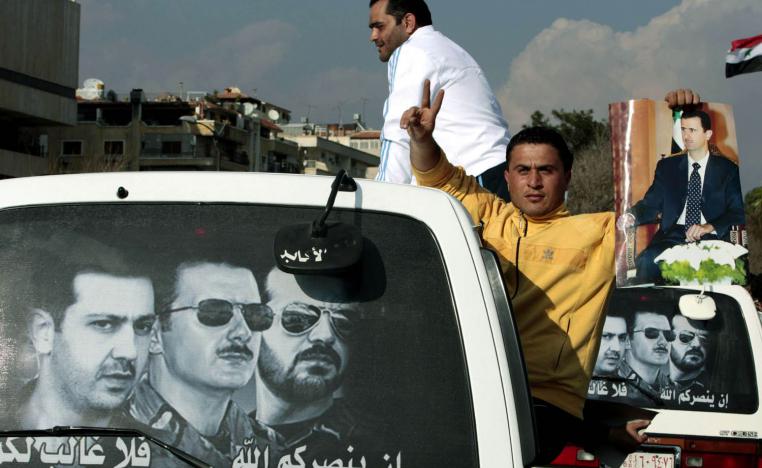The recent escalation on the outskirts of the occupied Golan Heights at the beginning of the week reveals deep contradictions, divisions, and overlapping within leadership and decision-making systems at various levels within this regime as Arab “normalization” with the Assad regime accelerates.
It is unclear whether it is just a mere coincidence that Israel’s shift in dealing with the head of the regime’s brother and indirect discrimination between him and his brother regarding the threat to “Israeli security” coincides with the airing of the series “Smile, Mr. General,” which delves into a dramatic vision of a power struggle between two brothers and their conflicting alliances with external parties to strengthen their opposing cards.
If we want to start with the problem that we referred to in the leadership and decision-making systems, the recent escalation shows that it starts from within the marginal militias affiliated with the regime. The ” Al-Quds Brigade ” militia, which an Iranian channel reported its responsibility for firing rockets at the occupied territories in the Golan, while a Russian agency – Sputnik – reported its denial of that responsibility, is a stark example of the contradictions and overlaps in the leadership and decision-making systems within the regime. This culminated in the dismissal of its deputy commander, on charges of “corruption”, only days after the “Al-Quds Brigade” leaders supported the adoption of rockets fire on the occupied Golan, through mass media.
Americans Negotiating with Assad in Oman: A Comprehensive Political Paper
The goal does not exceed proving Tehran’s ability to ignite all “fronts” if Israel decides to target the nuclear project in a decisive manner.
The militia that began as “Iranian” before becoming somewhat “Russian” has not been cleansed of Iranian infiltration. The recent escalation that occurred from within Syrian territory towards the occupied plateau, for the first time since 2018, coincided with a limited field impact “missile” escalation whose high political value comes from the fact that it started from Lebanon and Gaza Strip simultaneously. This confirms that the message is “Iranian,” and that the goal does not exceed proving Tehran’s ability to ignite all “fronts” if Israel decides to target the nuclear project in a decisive manner.
If the victory, represented in the dismissal of one of its prominent leaders, and denying responsibility for launching missiles, is for the Russians, at the end of a limited period of uncertainty about the affiliation of the “Al-Quds Brigade,” that does not deny the extent of Iranian infiltration and stability within this militia affiliated with the Assad regime for example. It is a contradiction that can be noticed at various levels within the system’s apparatus, up to the higher levels of leadership and decision-making within the regime; specifically, in the relationship between the two brothers who are going more and more towards strengthening the connection of each of them, with discordant external alliances and agendas.
It is noteworthy that the Israeli media indirectly exonerated Bashar al-Assad from the responsibility for targeting “Israeli security”. They blamed his brother, indicating that Bashar prevented Iranians from launching drones into occupied territories without his previous knowledge, which his “brother” violated before the recent escalation, according to Israeli sources.
This is Israel’s first involvement in the relationship between the two brothers, and it sheds light on what is believed to be contradictions between the two bothers’ alliances; a closer alliance linking Tehran to Maher on one side, and a closer one linking Moscow and Arab countries to Bashar on the other side. Thus, the Syrian regime appears with two heads, Bashar and his brother, and with two arms, Russia and Iran. This raises doubts about the ability of this regime to integrate completely in a specific direction due to differences in agendas between decision-makers within the regime.
If it is an exaggeration – at this stage – to describe this difference in agendas as a “conflict”; it is also an extreme simplification to describe it as a “coordinated performance” between the two brothers to delude the outside observer into the existence of a “conflict”, and to benefit from this illusion. The closest characterization available in political science to the situation within the Syrian “regime” is that of “competitive cooperation”. This applies to the relationship between the Russians and the Iranians in Syria, since 2018 and still is. It also applies to the relationship between the two brothers, which does not rise to the level of “conflict”, for fear of cracking the entire “system”, and does not fall to the level of “illusion” that a conflict exists. Given that, the existence of a conflict contradicts the feature most applicable to the relations between siblings and heirs in the ruling family systems.
At this qualitative juncture, Israel intervenes on the line of the relationship between the two brothers, to target Maher, and warns, through its media, of a major shift in the nature of its chronic targeting of the “Syrian” depth. Israel will target Maher, and the drug industry and smuggling network, which constitutes an icon of his strength and richness. This coincides with promises reported by the Saudi media, and by regime representatives, that Bashar al-Assad intends to curb drug smuggling to the Gulf states. This means if the intention to implement the promise was “sincere”, it targets Maher al-Assad’s interests. This enhances the possibility of a “competitive dimension” at the expense of a “cooperative dimension” in the relationship between the two brothers. Perhaps, in the medium term, it will reach a state of open “struggle” over power.
This article was translated and edited by The Syrian Observer. The Syrian Observer has not verified the content of this story. Responsibility for the information and views set out in this article lies entirely with the author.


